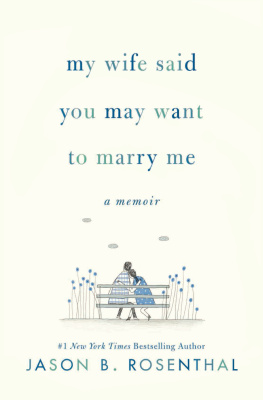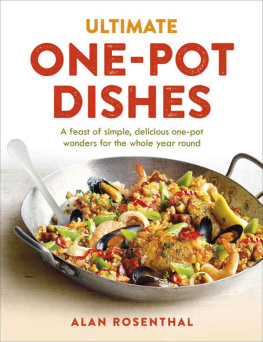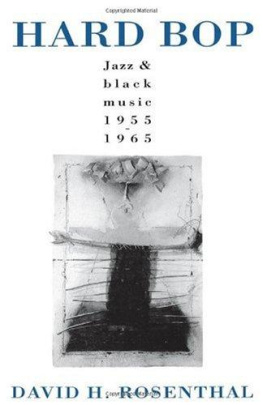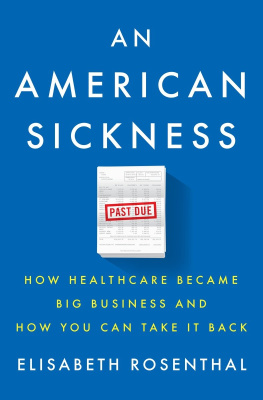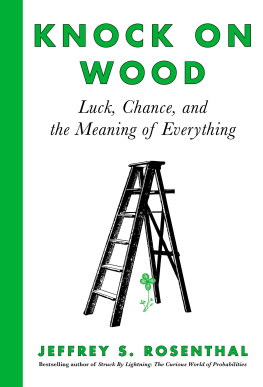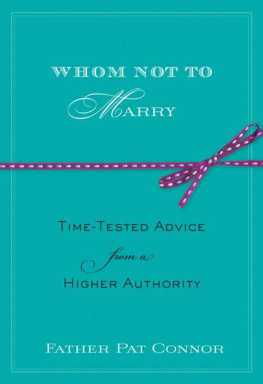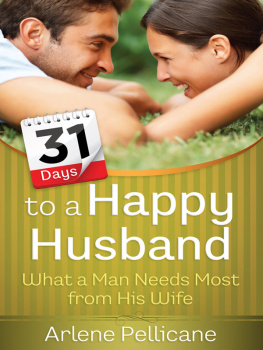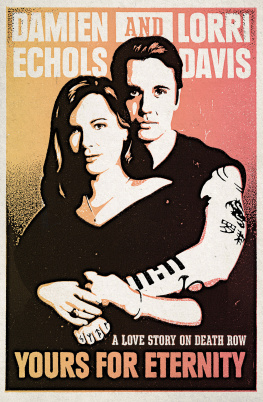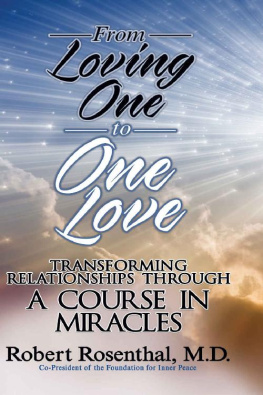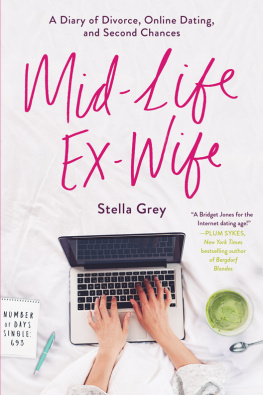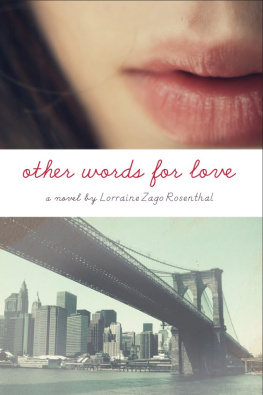Contents
Guide
This book is dedicated to
Amy Krouse Rosenthal
(and the rest of the Rosies: Justin, Miles, Paris & Cougar)
Contents
It is a tremendous act of violence to begin anything.
I am not able to begin. I simply skip what should be the beginning.
Rainer Maria Rilke
I am writing this book because my wife died of ovarian cancer, but before you put it down and run in the other direction, please know, this wont be a maudlin tale of death.
It cant be.
The inspiration for writing this is a creative force, a woman who devoted her life to family, community, and connection, and had the kind of spirit we need a lot more of. She would have hated merely a dark tale of the end of life, because we had such a rich life together for over twenty-six years. Amy was an original. The last thing she would want is for the story of our lives together to wallow in humorless self-pity, because honestly, our time together had everything but that.
What this book is, instead, is an exploration of what it means to love, to lose, and to emerge from that loss somehow ready to be resilient in surprising and unexpected ways. It is a story of love and loss but also of appreciating the joy, beauty, and vitality of life. A story of how you come to the end of one part of your life and find a way to turn the page to the next. A story of my life with an exceptional woman, my wife, Amy Krouse Rosenthal. And a story of life without her as well.
Amy was an author, speaker, and filmmaker. As an author of two groundbreaking memoirs and as a childrens book author, she has touched thousands of minds, both young and old, but the piece of writing she is best known for is an essay that appeared in the Modern Love column of the New York Times. Its called You May Want to Marry My Husband, and it was published on March 3, 2017.
Ten days later, Amy died.
She was too ill to appreciate the response, but it was spectacular. Her essay immediately went viral and was ultimately read by more than five million people. The genuineness of her voice leapt off the page to all who encountered it. The article was many things, but most of all it was a message to me. In retrospect, I now think that Amy, who after all knew me better than any human on this planet after twenty-six years of marriage and building a family and life together, perhaps thought that I needed her express permission to find love after she died. Its a difficult thing for a dying spouse to say to her partner, let alone share with the entire world. And yet, like so much that Amy did, she pulled it off in a seemingly effortless manner.
The ten days between the date the essay was published and the day Amy died seemed like a microcosm of everything life has to offerwhat should have been her highest high was tragically overshadowed by her imminent death. That impossible set of circumstances sent me on a journey I never imagined, didnt want, and couldnt have predicted; in one way it had an ending that came too soon. In another, it is an adventure that I will be on for the rest of my life. An odyssey that was made possible because of Amy.
In the years since Amys death, I have spoken publicly about her quite a bit. I have talked about us together, and even about our family. I have tried to address peoples astonishment at how we loved and understood each other so deeply. I have opened up about my personal experience with the issues of being with someone you love at the end of their life and of loss in general. I have also used the metaphor of the empty space that Amy gave me in her article to talk about resilience in the face of devastating loss. I have discussed the struggles of being single, single parenting, and doing something meaningful in my professional life while trying to fulfill her final wishes for me. However, I have not talked much about myself personally until now.
What follows in these pages is my attempt to share whatever small pieces of wisdom Ive gained from an otherwise devastating process. Amy was a lot of things, but perhaps above all else, she was an optimist, her hunger for life insatiable. Her way of looking at the world was inspiring, even during difficult moments, and she would have delighted in the idea that some part of our story together could help someone else through their own personal darkness.
Not all love stories end the way you want them to, but often, thats what makes them worth telling.
So, darling, be home soon
I couldnt bear to wait an extra minute if you dawdled
My darling, be home soon
Its not just these few hours, but Ive been waiting since I toddled
For the great relief of having you to talk to.
John Sebastian
I m a Chicago guy, born and raised. And in order to understand where Amy and I began, it helps to understand where I began.
Family has always been the center of who I am. My parents divorced when I was two years old. For the next eight years, until my mom, Jo, remarried, it was just Mom; my older sister, Michel; and me. The way my mom raised me on her own established the core of the man Ive become. She struggled and did her best, and she went back to grad school and got her masters degree in social work by the time I was five. (Shes still practicing.) She was super liberal, always encouraging me to be independent and do my own thing, as long as my own thing wasnt stupid enough to throw my life out of order. I pushed the limits a little every once in a while, but I always respected her too much to make her wonder where I was or what I was doing.
My dad, Arnie, was a complicated man. He was definitely around on occasional weekdays and weekend sleepovers, and this was one cool, fun dude in my formative years. He was handsome, with a full head of hair, so no surprise that he always had a girlfriend. He was into sports and music, an idiot savant when it came to jazz. He was a beautiful artist who could draw anything, and an art historian who could spend hours in a museum.
Dad was obsessively devoted to his mother, my grandma Sara, and he routinely took my sister and me to visit her in Skokie, Illinois, a hub of the Jewish community that settled there after World War II. Her community, just outside of the Chicago city limits, was also the focus of a court battle brought by the National Socialist (Nazi) Party of America to have the right to march in this neighborhood where many Holocaust survivors lived. Grandma Sara was a widow. She lived in a small apartment filled with furniture that was covered entirely in plasticGod forbid an unsanitary tush should make actual contact with the upholstery. No matter what restaurant we went to, particularly if it had bread service, Grandma Sara would inevitably walk out with a purse full of freebies. Im pretty sure I even saw salt and pepper shakers in there a time or two. Sundays at her place were mostly spent watching the Chicago Bears on TV while my sister entertained herself doing anything else.
For most of my childhood Dad was in the advertising business, which I thought was a very sexy job. He was a highly intelligent man, but unfortunately, he wasnt the best at business. When I was in high school, he opened a commercial film studio in Lincoln Park. It seemed to be the culmination of Arnies dream. It was also the perfect storm of his self-image as an artist and his earnest attempt at being a successful businessman, which is to say it didnt last as long as hed hoped. But I have fond memories of working for him one summer in high school. I was, among other things, a production assistantor, more accurately, an assistant to an assistant, driving a massively large van, picking up directors from the airport, and doing whatever grunt work no one else wanted to do. The hours were long, with plenty of all-nighters, but I was excited to have a closer look at what my dad was up to, and I learned a lot about the value of hard work and making money.
Next page
